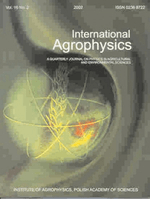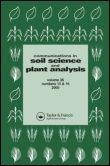
International Agrophysics
Scope & Guideline
Exploring the intersection of science and sustainability.
Introduction
Aims and Scopes
- Sustainable Agricultural Practices:
Research promoting practices that enhance sustainability, including conservation tillage, organic farming, and the dual-use of land (e.g., agrivoltaics) to optimize yield while minimizing environmental impact. - Soil and Water Management:
Studies focusing on the physical properties of soils, water retention, and irrigation efficiency, including the impact of various agricultural practices on soil health and moisture dynamics. - Technological Innovations in Agriculture:
Exploration of advanced technologies, such as machine learning, remote sensing, and bioengineering, to improve agricultural productivity, crop management, and resource use efficiency. - Crop Productivity and Quality:
Investigations into factors affecting crop yield and quality, including the influence of environmental conditions, soil management, and agricultural inputs on different crop species. - Environmental Impact Assessments:
Research evaluating the ecological consequences of agricultural practices, including greenhouse gas emissions, soil degradation, and biodiversity assessments.
Trending and Emerging
- Machine Learning and Data Science Applications:
An increasing number of studies are employing machine learning techniques to analyze agricultural data, optimize crop management, and enhance predictive modeling for yield and environmental impacts. - Impact of Climate Change on Agriculture:
There is a growing focus on understanding how climate change affects agricultural systems, including studies on drought resistance, temperature effects on crop physiology, and adaptive strategies. - Biotechnology and Soil Health:
Emerging research on the role of biotechnology, such as biochar and microbial amendments, in improving soil health and crop productivity is becoming more prominent. - Remote Sensing and Precision Agriculture:
The utilization of remote sensing technologies for monitoring crop health, soil moisture, and land use changes is increasingly popular, reflecting a trend towards more precise agricultural practices. - Circular Economy in Agriculture:
Research exploring the integration of waste materials, such as compost and bio-waste, into agricultural practices to promote sustainability and resource efficiency is on the rise.
Declining or Waning
- Traditional Chemical Fertilizers:
There is a noticeable decrease in studies focusing solely on traditional chemical fertilizers, as the emphasis has shifted towards integrated nutrient management and organic practices. - Single-Crop Systems:
Research centered on monoculture systems has diminished in favor of studies exploring crop rotation, intercropping, and polyculture approaches that promote biodiversity and resilience. - Basic Agricultural Mechanization:
Papers specifically addressing basic mechanization techniques appear less frequently, as the trend shifts towards precision agriculture technologies and automation.
Similar Journals

Revista de Agricultura Neotropical
Empowering Innovation in Agronomy and Crop ScienceRevista de Agricultura Neotropical, published by UNIV ESTADUAL MATO GROSSO SUL, serves as a pivotal platform for disseminating research in the fields of agronomy and crop science. Since its inception as an open-access journal in 2014, it has been dedicated to promoting innovative research and practical applications within the agricultural sector, specifically tailored to the challenges and dynamics of the tropical agriculture landscape in Brazil and beyond. Although currently positioned in the Q4 quartile of Scopus rankings, and with a modest agricultural science percentile, the journal actively encourages contributions that highlight sustainable agricultural practices, tropical crop management, and emerging technologies in farming. With its commitment to open access, the Revista de Agricultura Neotropical broadens the reach of critical knowledge, making it accessible to researchers, professionals, and students alike, thus fostering a collaborative environment for advancing agri-scientific initiatives.

APPLIED ENGINEERING IN AGRICULTURE
Enhancing Productivity and Sustainability in Agriculture through Engineering Excellence.APPLIED ENGINEERING IN AGRICULTURE is a peer-reviewed journal published by the American Society of Agricultural and Biological Engineers, dedicated to advancing the field of agricultural engineering through the dissemination of high-quality research. With an ISSN of 0883-8542 and an e-ISSN of 1943-7838, this journal has been a key resource since its inception in 1985, serving as a vital platform for scholars and practitioners to share innovative ideas and practical solutions that enhance productivity and sustainability in agricultural practices. The journal is ranked in the Q3 category for Engineering (miscellaneous) as of 2023, and is positioned within the 43rd percentile of the general engineering rankings in Scopus. While not currently an open-access journal, APPLIED ENGINEERING IN AGRICULTURE remains crucial for researchers and professionals looking to explore diverse engineering solutions that address the complexities of modern agriculture, making it an invaluable resource for anyone committed to improving agricultural systems through engineering advancements.

Romanian Agricultural Research
Nurturing Innovations in Agronomy and Crop ScienceRomanian Agricultural Research is a prominent academic journal dedicated to advancing the field of agricultural science with a specific focus on agronomy and crop management. Published by the NATL AGRICULTURAL RESEARCH & DEVELOPMENT INST in Romania, this journal has established itself as an important resource within its discipline, evidenced by its Q3 ranking in the Agronomy and Crop Science category for 2023. With its ongoing publication since 2008, the journal provides a platform for researchers and professionals to disseminate their findings and share innovative practices that address the challenges faced in agricultural development. Although it operates under a non-open access model, Romanian Agricultural Research commits to rigorous peer-review processes, ensuring the high-quality content that enhances the academic community’s knowledge base. The journal's objective is to foster dialogues surrounding sustainable agriculture, improve crop yield, and contribute to the enhancement of agricultural practices globally. Researchers, professionals, and students will find this journal to be an invaluable repository of knowledge and a catalyst for future agricultural innovations.

Advances in Agriculture
Transforming Agriculture with Open Access InsightsAdvances in Agriculture is a prominent Open Access journal dedicated to the dissemination of high-quality research in the fields of agriculture, agronomy, animal science, food science, and soil science. Published by HINDAWI LTD from the United Kingdom, this journal has made significant strides since its inception in 2014, contributing to the advancement of agricultural knowledge and practices. With an impressive impact factor reflected in its tiered quartile rankings, notably Q2 in Agricultural and Biological Sciences (miscellaneous), Agronomy and Crop Science, and Animal Science and Zoology, it serves as a key platform for innovative research and applied science. The journal aims to provide researchers, professionals, and students with rich access to groundbreaking studies that can help shape sustainable agricultural practices and policies. Emphasizing a global audience, Advances in Agriculture promotes an inclusive dialogue among scholars to tackle contemporary challenges in agriculture, enhancing food security and environmental stewardship worldwide.

COMMUNICATIONS IN SOIL SCIENCE AND PLANT ANALYSIS
Connecting Science and Sustainability in Soil and Plant AnalysisCOMMUNICATIONS IN SOIL SCIENCE AND PLANT ANALYSIS, published by Taylor & Francis Inc, is a prestigious journal dedicated to advancing research in the fields of agronomy, crop science, and soil science. Established in 1970, the journal has maintained a significant presence over the years, with a commitment to publishing high-quality, peer-reviewed articles that contribute to the understanding of soil and plant interactions. With an impressive Q2 ranking in both Agronomy and Soil Science, it positions itself as a vital resource for researchers, professionals, and students alike, keen on exploring innovative solutions to contemporary agricultural challenges. Although it currently does not provide open access, the journal ensures wide dissemination through its established subscription services. The journal's focus on empirical research, methodologies, and technological advancements in soil management and plant nutrition makes it an essential platform for disseminating knowledge and fostering discussions within the scientific community. Located in the heart of Philadelphia, USA, it remains a significant contributor to the global dialogue on sustainable agriculture and environmental stewardship.

INDIAN JOURNAL OF AGRICULTURAL SCIENCES
Fostering collaboration for sustainable agricultural practices.Welcome to the Indian Journal of Agricultural Sciences, a vital resource for researchers and professionals in the field of agricultural sciences, published by the esteemed Indian Council of Agricultural Research. Established in 1974, this journal aims to disseminate high-quality research and developments in agronomy and crop science, facilitating knowledge exchange and advancement within the agricultural community. Though currently classified in the Q4 category according to 2023 data, it provides an essential platform for publication, contributing valuable insights towards sustainable agricultural practices. With an ISSN of 0019-5022 and an E-ISSN of 2394-3319, the journal houses important research that spans decades of convergence and collaboration, promoting innovation in agriculture across India and beyond. As an open access platform, it invites contributions that reflect a wide array of agricultural disciplines to foster sustainable food systems that address the challenges of food security. Join the network of scholars and practitioners by sharing your research and engaging with the profound work being done in this transformative field.

Agronomy-Basel
Connecting Global Researchers for Agricultural ExcellenceAgronomy-Basel is a leading international journal dedicated to advancing the field of agronomy and crop science, published by the respected MDPI. Since its inception in 2011, this open-access journal has provided a vital platform for the dissemination of high-quality research, featuring innovative studies and reviews that contribute to the understanding of agricultural practices and crop management. With an impressive impact factor and ranked in the Q1 quartile of its category for 2023, Agronomy-Basel has established itself as a premier resource in the realm of Agricultural and Biological Sciences, achieving a commendable rank of #62 out of 406 in its field, placing it in the 84th percentile. The journal targets researchers, professionals, and students who are dedicated to enhancing agricultural sustainability and productivity. Located in Basel, Switzerland, the journal's commitment to open access empowers global accessibility to flourishing agricultural advancements, thus fostering collaboration and innovation across the globe.

Agrosystems Geosciences & Environment
Bridging the gap between agriculture and environmental science.Agrosystems Geosciences & Environment, published by WILEY, is a premier open access journal dedicated to advancing the interdisciplinary field of agricultural and environmental sciences. With an E-ISSN of 2639-6696, the journal has gained recognition since its inception in 2018, currently holding a Q2 ranking in Agricultural and Biological Sciences, Plant Science, and Soil Science. Operating from the United Kingdom, Agrosystems Geosciences & Environment contributes significantly to knowledge generation and dissemination, offering vital insights into sustainable practices, soil management, and crop optimization. Researchers and professionals will find the open access model particularly advantageous, promoting greater visibility and engagement within the scientific community. By bridging the gap between geosciences and agrosystem management, this journal is vital for those committed to addressing today's critical environmental challenges.

BRAGANTIA
Connecting Research to Real-World ImpactBRAGANTIA, published by the Instituto Agronômico, is a distinguished open access journal that has been a vital resource since its inception in 1977. With an ISSN of 0006-8705 and E-ISSN 1678-4499, this journal is recognized for its contributions to the field of Agricultural and Biological Sciences, where it currently holds a respectable Q2 ranking as of 2023. Additionally, BRAGANTIA is indexed in various databases, supporting its impact within Materials Science (Q3 ranking). Positioned in Brazil, the journal promotes the dissemination of high-quality research, aiming to bridge the gap between academia and practical applications in agricultural innovation and sustainability. Researchers, professionals, and students looking to keep abreast of recent advancements and their implications will find BRAGANTIA to be an indispensable platform for sharing and accessing vital agricultural knowledge.

Icelandic Agricultural Sciences
Nurturing Sustainable Practices in AgronomyIcelandic Agricultural Sciences, published by RANNSOKNASTOFNUN LANDBUNADARINS, serves as a vital platform for the dissemination of research in the field of Agronomy and Crop Science. Established to contribute to the advancement of agricultural knowledge in Iceland and beyond, this journal aims to foster collaboration among researchers, professionals, and students dedicated to sustainable agricultural practices. Despite facing a Q4 category ranking in 2023 and a ranking of #344/406 in Scopus, the journal continues to attract diverse research contributions, especially focusing on unique challenges and innovations pertinent to Icelandic agriculture. The journal operates under a traditional access model, providing an essential resource for those looking to deepen their understanding of agronomic developments and their implications for the agricultural sector. With a commitment to increasing awareness and promoting scientific dialogues, Icelandic Agricultural Sciences plays a crucial role in nurturing the field's growth and enhancing agricultural research.